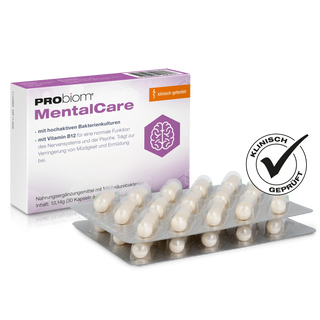Probiotics are now considered small helpers with big effects. Whether in yogurt, capsules, or fermented foods, they promise improved digestion, a strengthened immune system, and even positive psychological effects. But as healthy as probiotics seem, many people rightly ask the question: Can probiotics also have side effects? The answer is more complex than one might initially think.
What are probiotics anyway?
Probiotics are live microorganisms—usually bacteria or yeasts—that, when consumed in sufficient quantities, can have health benefits for humans. They are particularly well-known for their positive effects on the gut. They support the balance of intestinal flora, aid digestion, and can keep pathogenic germs at bay.
Commonly used probiotic strains include:
-
Lactobacillus acidophilus
-
Bifidobacterium bifidum
-
Saccharomyces boulardii (a yeast)
The positive effects – an overview
Numerous studies prove the effectiveness of probiotics in certain complaints:
-
After taking antibiotics: Restoring the intestinal flora
-
Diarrhea (especially traveler's diarrhea or antibiotic-associated diarrhea)
-
Irritable bowel syndrome
-
Bloating, constipation and other digestive problems
-
Strengthening the immune system
-
Support for skin problems (e.g. eczema)
However, although probiotics are generally considered safe, there are situations in which they can cause unwanted side effects .
What side effects can occur?
1. Bloating and feeling of fullness
The most common side effect of taking probiotics is increased bloating, a feeling of fullness, or slight abdominal pressure —especially at the beginning of use. This is because the microbes first have to adapt to the new "environment" in the gut, resulting in a short-term change in the bacterial composition.
2. Diarrhea or constipation
Some people experience paradoxical reactions: Instead of improvement, digestion may initially worsen. Bowel movements may change, leading to mild constipation or even loose stools . These symptoms usually disappear after a few days.
3. Allergic reactions
In addition to the microorganisms themselves, probiotic preparations also contain excipients such as carriers, binders, or capsule shells. People with allergies or intolerances (e.g., to dairy products, gluten, or certain additives) should check the ingredients carefully. In rare cases, the microorganisms themselves can trigger an immune reaction.
4. Infections – very rare, but possible
In immunocompromised individuals , such as those following organ transplants, chemotherapy, or HIV infection, the ingestion of live microorganisms can theoretically lead to infections . For example , fungal infections caused by Saccharomyces boulardii or bacterial blood poisoning (sepsis) have been described in isolated cases in critically ill patients. Here, too, this generally only occurs in severely weakened immune systems .
Who should use probiotics with caution?
There are certain groups for whom the intake of probiotics should be particularly carefully considered or supervised by a doctor:
-
People with weakened immune systems
-
Patients with artificial heart valves
-
Premature infants
-
People with central venous catheters
-
People with short bowel syndrome
In these cases, possible intake should always be discussed individually with a doctor.
How can side effects be avoided?
-
Slowly introduce : Start with a low dose and increase it slowly.
-
Choose high-quality products : Look for scientifically tested strains and well-documented preparations.
-
Check ingredients : If you have allergies or intolerances, you should take a close look at the additives.
-
Talk to your doctor : If you have chronic illnesses or are unsure about anything, it is better to consult your doctor.
Conclusion: Mostly well tolerated – but not entirely without risk
Probiotics are safe and well-tolerated for most people. They can provide many health benefits, particularly for gut health. Side effects are usually mild and temporary —such as bloating or changes in bowel habits. Serious complications are very rare and usually only affect people with serious underlying health conditions.
If you are unsure or belong to a risk group, you should not take probiotics on your own, but seek the advice of a medical professional.

















